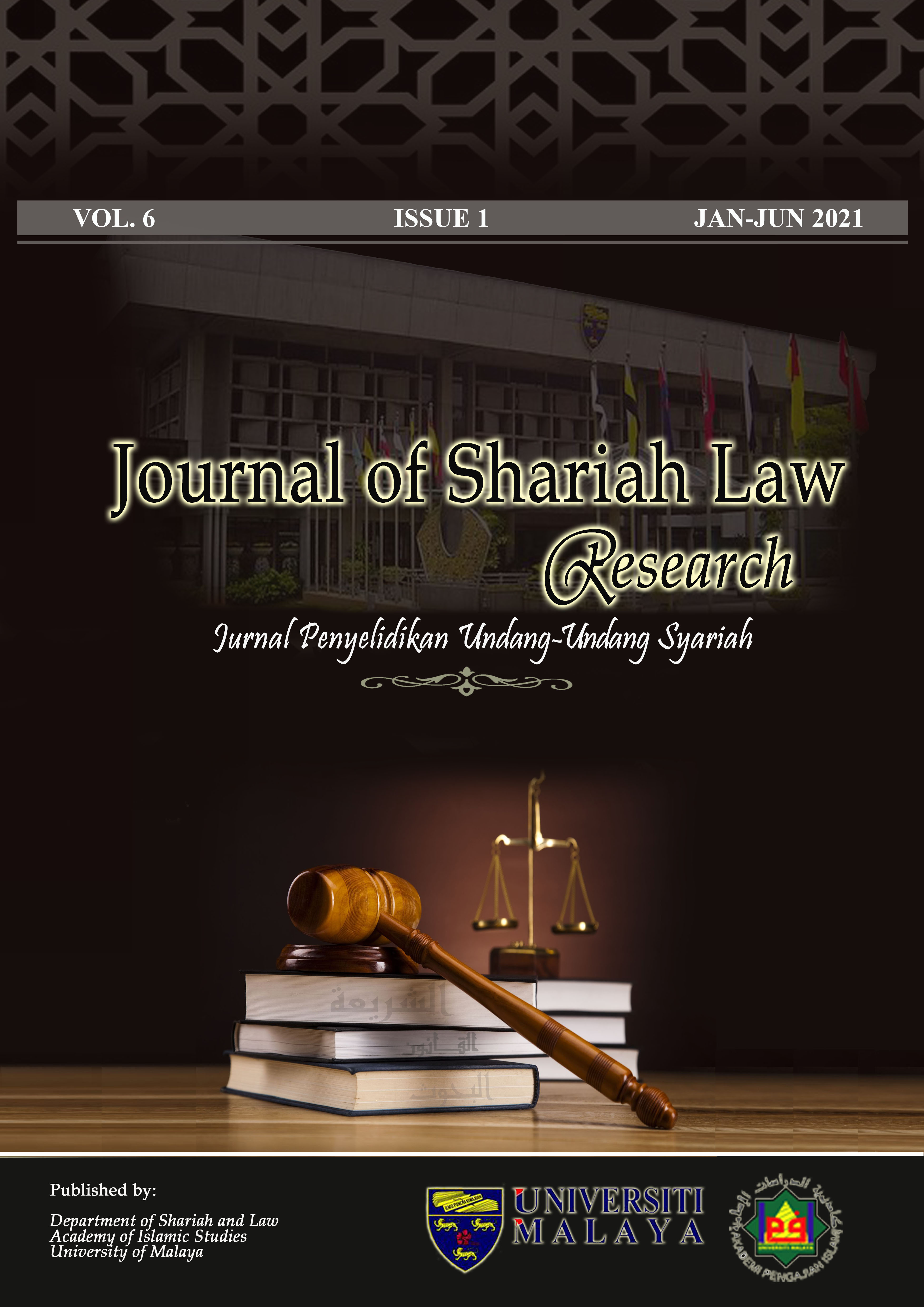A REVIEW OF LITERATURE ON THE CHALLENGES OF SHARIAH GOVERNANCE IN ISLAMIC BANKING IN NIGERIA
DOI:
https://doi.org/10.22452/jslr.vol6no1.1Keywords:
legal framework, Islamic banking, Shariah governance, Shariah compliance, legal challengesAbstract
Many studies have been conducted on challenges of Islamic banking. However, most studies are based on general studies of Islamic banking. This paper focuses on the literature on the institutional and operational challenges of Islamic Banking in Nigeria. The paper employs a doctrinal method of legal research by conducting qualitative content analysis of primary and secondary sources of materials. The study finds that there are many gaps on the literature which this research aims at proving the link in order to promote the growth of the industry. The paper concludes that a sound and effective literature on Shariah governance will give confidence to the general public about Shariah conformity of Islamic Banking in Nigeria.
Downloads
References
Abikan, A.I. (2012). “The Legal Framework for Islamic Banking in Nigeria,” Journal of Islamic Banking & Finance, vol. 29, no. 4, 20-39.
Abikan A.I. & Ahmed I.B. (2017). “Shariah Governance of Islamic Financial Institutions (IFIS): An Analysis of the Central Bank of Nigeria (CBN) Regulatory Guidelines,” KIU Journal of Social Sciences, vol. 3, no. 1, 303-316.
Abdullahi, N.A (2016). “Islamic Banking in Nigeria: Issues and Prospects,” Journal of Emerging Economics and Islamic Research, vol. 4, no. 2, 1-17.
Abdurahman, S. & Shittu, H. (2016). “Islamic Banking and Its Implications on Human Capital Development in Nigeria,” Journal of Islamic Banking and Finance, vol. 33, no. 3, 25-38.
Adeniran, L.M. (2014). “Operationalizing Islamic Banking in Nigeria: Challenges and Opportunities,” Economic and Finance Review, vol. 3, no. 6, 21-27.
Ahmad, I.M. (2016). “Operational Challenges in Shariah Governance of Islamic Financial Institutions (IFIs) in Nigeria: Issues and Solutions,” Journal of Islamic Economics, Banking and Finance, vol. 12, no. 3, 216-235.
Alharbi, A. (2015). “Development of Islamic Banking System,” Journal of Islamic Banking and Finance vol. 3, no. 1, 12-25.
Ali, E.R.A.E., Odierno, H.S.P. & Ismail, A. (2015). Essential Guide to Takaful (Islamic Insurance). Kuala Lumpur: CERT Publications.
Ali, S.S. (2007). “Financial Distress and Bank Failure: Lessons from Closure of Ihlas Finance in Turkey,” Islamic Economic Studies, vol. 14, no. 1 & 2, 1-52.
Alkali, M.B. (2015). “Challenges in Implementing Islamic Banking and Finance in Nigeria: A Legal Insight,” Jurnal Syariah, vol. 23, no. 1, 141-166.
Bello, A. (2014). “Challenges and Solutions to Islamic Banking System in a Pluralistic-Secular Country like Nigeria,” Mediterranean Journal of Social Sciences, vol. 5, no. 6, 25-34.
Buang, A. H. (2007). “Islamic Contracts in a Secular Court Setting: Lessons from Malaysia,” Arab Law Quarterly, vol. 21, 317-340.
Chapra, M.U. (2009). “The Global Financial Crisis: Can Islamic Finance Help?,” Al-Manar: Internal Information Bulletin of the Islamic Development Bank Issue, no. 102, 45.
Chiroma, M. Sandabe, A.K. Abdullah, M.A. & Ansari, A.H. (2016). “Legal Framework Regulating Islamic Finance in Nigeria: A Critical Appraisal of Hurdles against the Effective Shariah Governance,” Unimaid Journal of Private and Property Law, vol. 1, no. 1, 245-253.
Daud, M. Yussof, I.M. & Abideen, A. (2011). “The Establishment and Operation of Islamic Banks in Nigeria: Perception Study on the Role of the Central Bank of Nigeria,” Australian Journal of Business and Management Research, vol. 1, no. 2, 14-15.
Iqbal, Z. & Mirakhor, A. (1987). “Islamic Banking,” International Monetary Fund Occasional Paper 49, Washington D.C.
Gafoor, A.I. & Abdul, M. (1995). Interest-free Commercial Banking. Groningen, the Netherlands: Apptee Publication.
Malami, H.U. (1992). “Prospects of Islamic Banking in the Muslim Minority Communities,” Journal Institute of Muslim Minority Affairs, vol. 13, no. 2, 308-316.
Mohammed, B.Y. (2011). “Financial Markets Series: Islamic Banking System,” Islamic Economics, 10-11.
Nkwatoh, L.S. (2014). “The Operational Challenges of Islamic Banks and its Competitiveness with Conventional Banks in Nigeria,” Proceedings of the First Asia-Pacific Conference on Global Business, Economic, Finance and Social Sciences, Singapore.
Obiyo, O.C. (2008). “Islamic Financing /Banking in the Nigerian Economy: Is It Workable? A Review of Related Issues and Products,” International Journal of Islamic and Middle Eastern Finance and Management, vol. 1, no. 3 (2008), 227-234.
Olad, M.M. (2015). “Islamic Banking: Prospects, Opportunities and Challenges in Ethiopia,” Master Dissertation of Business Administration, Addis Ababa University, Ethiopia.
Sani, H. (2016). “An Evaluation of the Operation of Non-Interest Banking under the Existing Legal Framework in Nigeria,” Master Dissertation, Ahmadu Bello University, Zaria.
Sanusi, L. (2011a). “Islamic Finance in Nigeria: Issues and Challenges,” Lecture, Markfield Institute of Higher Education (MIHE), Leicester, UK.
Sanusi, L. (2011b). “Guidelines for the Regulation and Supervision of Institutions Offering Islamic Financial Services (IIFS) in Nigeria,” Leadership Newspaper, 22 June 2011.
Taliep M.I, Hassan R. &Yusoff (2010). “A Viability of Islamic Banking and Finance in South Africa: A Look at the Legal Framework and Governance,” IIUM Law Journal, vol. 18, no. 2, 239.
Yasin, N. (2006). “Legal Aspects of Islamic Banking: Malaysian Experience,” in Islamic Banking and Finance: Fundamentals and Contemporary Issues, ed. Ali, S.S. and Ahmed, A. Jeddah: Islamic Development Bank (IDB), 215-238.
Yunusa, M. & Nordin, N.B. (2015). “Religious Challenges of Islamic Banking in Nigeria,” International Journal of Academic Research in Business and Social Sciences, vol. 5, no. 4, 46-66.
Yussof, I.M. & Daud, M. (2011). “The Perceptions of Nigerian Muslim Youths in Malaysia on the Establishment and Operation of Islamic Banks in Nigeria,” International Journal of Business and Social Science, vol. 2, no. 10, 151-165.
Zubair, A. & Alaro, A.A. (2009). “Legal and Operational Frameworks of Islamic Windows in Conventional Financial Institutions: Nigeria as a Case Study,” Saudi-Arabia International Conference on Islamic Bank and Finance, University of Ilorin and Islamic Research and Training Institute, Jeddah.
Downloads
Published
How to Cite
Issue
Section
License

This work is licensed under a Creative Commons Attribution-NonCommercial 4.0 International License.








